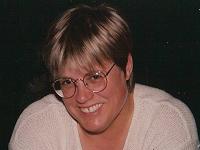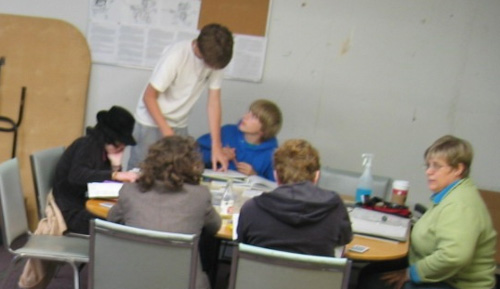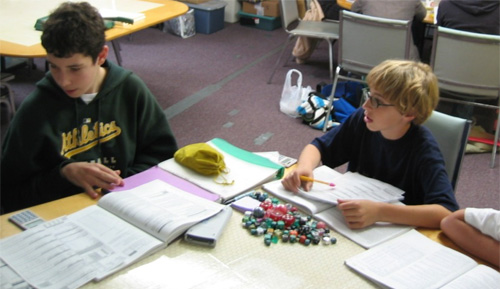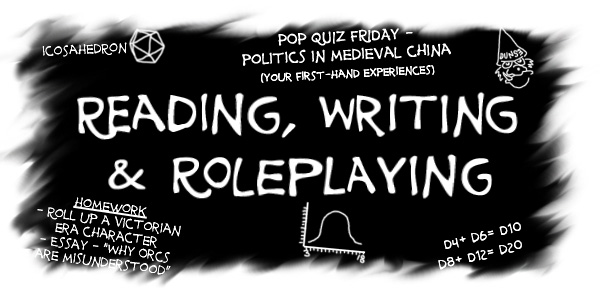 |

|
AN INTERVIEW WITH REBECCA THOMAS OF ROLEPLAY WORKSHOP Rebecca
Thomas is the heart of The
Roleplay Workshop
in Oakland, California, which began in 1989 as a summer program for
students in 6th through 8th grades, and has since expanded to a
year-round program with after school, summer, and special event
programs. The program uses an interactive storytelling game of her own
design, called Abantey, that aids in teaching math, science,
and
problem solving skills. Rebecca
Thomas is the heart of The
Roleplay Workshop
in Oakland, California, which began in 1989 as a summer program for
students in 6th through 8th grades, and has since expanded to a
year-round program with after school, summer, and special event
programs. The program uses an interactive storytelling game of her own
design, called Abantey, that aids in teaching math, science,
and
problem solving skills.Rebecca was gracious enough to answer some questions for me about her program and how it works. What inspired you to create Abantey? Did it start out as a teaching tool, or did it evolve into one? Like many
things, it started out in an unexpected manner. I was
teaching a combined 6-8th grade class (ages 11-13), all subjects, at a
very small private school in 1998. I had the students working on a
project to 'design a world'. We began with its structure (land masses,
water), moved on to atmospherics (weather), and were looking ahead to
designing cultures for each continent and their trade relationships.
While the students were working on their class project, I used the time
to begin design of a role playing world/system.
My students 'caught' me. They asked to play test the game. The school administration was supportive, so we play tested it a few times. The students got so excited about the game, that they talked to their parents, who approached me and asked me to run the game as a week-long summer day camp. I did. It was well received, with 6-12 kids enrolling for 8 different weeks. The next school year, I was asked to continue the game as an after school activity. After three years, I was having much more fun working with the kids through the RPG, and felt I was having a bigger impact there than in the classroom. I quit teaching in 1993, and began running after school programs and summer programs full time. Can you give examples of how the system encourages different math processes? The game
system we use has a lot of math, everything from simple
arithmetic up to percentages and probabilities. We make calculators
available, but also show by example that the more core facts (addition,
multiplication) you know, the quicker you can reach a solution. We
teach them how to do the math if they don't already know it. This
includes how to read standard mathematical formulas, the order of
operations and more. Of course, we don't say that's what we're doing,
it's just a step in figuring out, for example, how fast the character
is going, or how long it will take them to catch up to the 'bad guys'.
(a classic algebra problem!)
Please explain some of the ways that Abantey builds social skills. -
Communication Skills
Each student gets a turn to give or comment on ideas when they're making plans. Obviously some students are very good at this, and others are not. We help the shy kids learn how to express themselves, to have the confidence to speak out. We help others find positive ways to give feedback. For example, it's not very helpful to tell someone their idea is stupid, but it can be very helpful to, if done politely, point out weaknesses in an idea. For our students with social cue recognition problems, we may go as far as teaching them how to tell if someone is sad or angry by their words and by their body language. - Listening Skills This is a tough one for some kids. It is common for kids (and adults) to be very self focused and unwilling or unable to let others 'be right' or to admit that other ideas may be 'better' than their own. In the game we stress that there are many ideas that will 'work' in any situation. Some will have more desirable outcomes and others will have less desirable outcomes. Sometimes the players need to 'play through' these before they begin to understand and modify their outlook. Have you had any negative experiences while running the program, and if so, how did you handle them? Purely
negative experiences - no. Certainly, over the last 18 years,
there have been challenges, ranging from personality conflicts, to
story lines that fall apart and unhappy players. Handling them, while
not always easy, is a matter of listening, compromising if needed,
making changes if necessary, taking responsibility for failures,
creating clear boundaries and working to communicate clearly.
 How many kids do you normally
work with at a time? How many kids do you normally
work with at a time?We have groups
of 3 to 6 players. When we have learning or
developmentally challenged players, we like to keep a ratio of two
'norm rated' students to one challenged student. We sometimes have
dedicated groups of three or four students with learning or
developmental challenges to work on specific issues. We currently have
space to run up to three full groups of kids at a time. During our
summer programs, we usually run at capacity: 3 tables of 6 players,
supervised by a Game Master and an assistant.
What would you say are your biggest hurdles, challenges, and difficulties? Well, I've
certainly had many challenges! In the beginning, the biggest
was convincing parents that a role playing game could be an educational
tool. Many people here, even in the liberal San Francisco Bay Area,
have negative associations with role play gaming. I addressed this
issue by calling what we do "interactive improvisational storytelling",
and emphasizing my teaching credentials in General Sciences, Biology
and Psychology.
Even now, when many parents fully grasp just what the program offers their child, others still see it as 'just a game' with no more value than paying to send their child to a movie. I'm sure the issue could be addressed if I had more marketing skills, or could employ a marketing professional to 'spin' my product. Or, of course, if our educational system would recognize the value of role play gaming as an educational tool. Tell us more about the afterschool program. Do you offer homework help to your players? Do you ever synchronize any lessons in your games with lessons that your players are covering in class? For awhile, I
offered a Study Skills group, but demand was not high.
I've also combined enrollment in after school programs with 1/2 hour of
tutoring before or after the program. Frequently, when some of the
students have arrived, but we're waiting for others, the kids will work
on homework, with my help when needed.
It would be interesting to synchronize games with school lessons, but since each group is composed of students from different schools, and often different grades, it would be a daunting task. I DO incorporate specific math concepts into the system of our game: averaging, order of operations, simple algebraic equation building (word problems).  Who runs the adventures beside
yourself? How do you co-ordinate your efforts, if at all? Who runs the adventures beside
yourself? How do you co-ordinate your efforts, if at all?I currently
have one other adult staff member, and 8 high school staff
members who are running games. I have a series of guidelines for game
subject matter. Each game master or game running team submits a game
outline to me for review before they run. I go over the game for
general story structure and 'run-ability', and make sure that any
'world changing' themes fit with the current 'world story'. I also look
for places where they may need to trim or pad the story to make it fit
the game time and the ability of the players they have.
The game world often goes through 'themes' or 'history making events', in which case, my staff and I sit down and discuss what types of games would fit in with the big story line. In general, my staff runs missions that are 'local', in that the missions are only involving individuals or local politics or small villages. I am responsible for missions involving the development of the world and larger events and politics. We make sure that if a game in being run (mine or anyone else's) that would have larger impact (say on several cities, or in some cases, the entire world), we coordinate the effects and implement them consistently. Where do you hold your sessions? What arrangements did you need to make to get the space? I began my
program by running it at the school where I taught. I
currently rent space from a local comic book and game store. I knew the
owners and when I needed my own space, I approached them. They've been
wonderfully supportive! Which is a good thing, as we don't generate
enough income to support paying market value business rent in the Bay
Area.
I see from your enrollment schedule that you have games running every day of the week, including weekends. When do you take time off for yourself? Time off?
What's that? Seriously, the big downside of running your own
SMALL business, is that you don't make any money if you're not working.
AND, running a business of running games is MUCH MUCH more
than just running the games. I manage all aspects of the business: answering emails, phone calls, billing, upkeep on the database, development, design and publication of all materials, marketing, mailings.... it's a very big list. I typically work 60 - 80 hours a week. However, I do shut down the business in September, when the kids are transitioning from summer to school. We get very low enrollment during this time, so it is more effective for me to take the month off. I usually end up spending one week 'ramping down' from the summer programs and one week 'ramping up' for the school year programs, so, I get about 2 weeks off. I also have a 'kid free' week before each summer program begins. I can sometimes take a break there, but often end up using the time to work on manual updating and publication, and enrollment. I also get any 5th weekend completely off! Yeah! So, in the interests of informing others who may want to do this: it's not a quick, easy business where you're going to make lots of money right away, work reasonable hours, have weekends off and get to take two or three vacations a year. Certainly, if we could get over the 'bump' and become big enough, it could be a different thing entirely -- office managers, web and marketing gurus. The biggest trick there is finding a way to have more income. During the summer, it's no problem. We work a 45 hour week and enroll 12 - 24 kids a week. We get weekends off. We make good money. During the school year, it's a different story. There are only 17.5 hours of gaming time a week - including after school (3:30 - 6:00) and Saturday (noon - 5). That means only 70 hours of work a month (not including the occasional school holiday). For an adult to make a living in the Bay Area, they need an income of $2000 - $4000 a month, depending upon their expenses. That would be a hourly wage of over $35. Which is not doable, unless we had zero business expenses or we could charge parents way more than $12 an hour, OR we could add groups outside of after school hours. There are many possible solutions, of course, butI haven't been able to implement them. Although, I'm pretty sure that someone who came from a business background instead of a teaching back ground, may be able to find a more effective way to become financially solid. How has the program affected your personal gaming time? Do you still find the desire to roleplay in your free time, or has turning it into a business changed that for you? Personal
gaming time... that is something that I really enjoy. I like
to develop characters and see just what the GM is going put my
character through next! For a long time, I had little or no
personal gaming time. The last thing I wanted/want to do is run more
games on my 'play time', and I had trouble finding a good gaming group.
However, I currently play in a fantastic weekly d20 campaign and a
truly swashbuckling bi-weekly 7 Seas game. I also run and play my
favorite system, CyberPunk, once a year at a local gaming convention
(DunDraCon).
I'll also admit, that I do manage to get a little of the feel of 'personal gaming time' by maintaining story lines with major characters over many years -- basically the development of my gaming world has become a vicarious outlet for my own roleplaying. One other factor that plays into my personal gaming time... as a GM who basically runs games all the time, I've gotten pretty picky about the games I play in. It's easy for me to anticipate what the GM is doing, and to end up spoiling the game for myself by guessing the ending. So when I game, I look for GMs who are really good at building a tight, consistent game, with subtle foreshadowing, dynamic plots and complex NPCs / PC interactions. I also really appreciate GMs who avoid making the players feel railroaded (tricky) while staying within the boundaries of their plot outline. Find out more about The Roleplay Workshop at www.roleplay-workshop.com |
